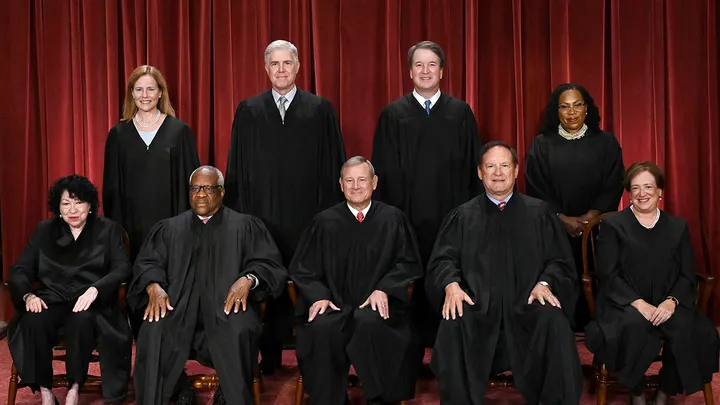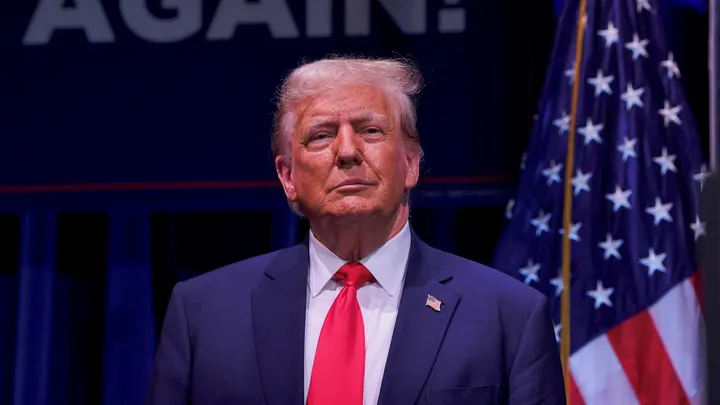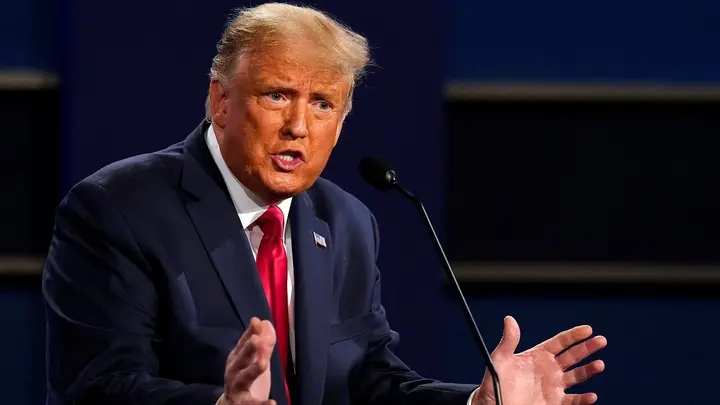Supreme Court oral arguments in Trump ballot access case scheduled for Feb. 8
The U.S. Supreme Court is set to discuss whether former President Donald Trump should be excluded from Colorado’s primary ballot. This marks the initial instance of potential legal challenges by Trump being brought before the nine justices.
The central question revolves around whether Trump engaged in “insurrection” by encouraging a crowd to breach the U.S. Capitol on January 6, 2021. The debate hinges on whether such actions would render him constitutionally disqualified for a potential re-election as president. Consequently, this could impede his inclusion as a candidate on a state primary ballot for the presidential race.
Related Post: As Republicans face cash problems and disarray in swing states, Democrats hold a vast fundraising advantage
Oral arguments are set for Thursday at 10 a.m. Eastern Time, and a prompt decision could be issued within days or weeks. The matters at hand have not previously been examined by the highest court in the country and are characterized as both a constitutional and political dispute, carrying significant implications for public trust in the judicial system and the already contentious electoral process.
The wording
The 14th Amendment, Section 3 of the U.S. Constitution declares, “No person shall… hold any office… under the United States… who, having previously taken an oath, as a member of Congress, or as an officer of the United States… to support the Constitution of the United States, shall have engaged in insurrection or rebellion against the same, or given aid or comfort to the enemies thereof.”

In December, Colorado’s highest court ruled that the aforementioned clause encompasses Trump’s actions on January 6, 2021. Consequently, it was determined that the clause does apply to a president, despite not being explicitly mentioned in the text.
The state court, in an unsigned opinion, stated, “President Trump is disqualified from holding the office of president. Because he is disqualified, it would be a wrongful act under the election code for the secretary to list him as a candidate on the presidential primary ballot.”
The crux of the matter may hinge on how the high court interprets whether the term “officer of the United States” encompasses a president’s actions while in office.
Related Post: Taylor Swift likely secured Super Bowl private jet parking months ago
In their merits brief, Trump’s legal team asserted, “The [Supreme] Court should put a swift and decisive end to these ballot-disqualification efforts, which threaten to disenfranchise tens of millions of Americans and which promise to unleash chaos and bedlam if other state courts and state officials follow Colorado’s lead and exclude the likely Republican presidential nominee from their ballots.”
Trump’s legal team argued that the Constitution treats the presidency differently from other federal officers. They emphasized that the president takes a distinct oath, outlined in Article II, wherein the commitment is to ‘preserve, protect, and defend the Constitution of the United States,’ and notably, the term ‘support’ is absent, unlike its presence in Section 3.

In response to Trump’s legal team, lawyers representing Colorado voters challenging Trump’s eligibility argued, “The essence of Trump’s stance is more political than legal. He not-so-subtly implies potential ‘bedlam’ if he is excluded from the ballot. However, we witnessed the ‘bedlam’ Trump incited when he was on the ballot and lost. Section 3 is specifically designed to prevent oath-breaking insurrectionists like Trump from having the authority to unleash such chaos again.”
“Nobody, not even a former President, is above the law,” the brief added, comparing Trump to a “mob boss.”
Also at issue: – Whether state courts or elected state officials can unilaterally enforce constitutional provisions and declare candidates ineligible for federal office — so-called “self-executing” authority — or is that exclusively the jurisdiction of the U.S. Congress. Also, whether Trump can be disqualified without a thorough fact-finding or criminal trial.
– Whether this issue is a purely “political” one that voters should ultimately decide.
– Whether the U.S. Senate’s acquittal at his impeachment trial on Jan. 6 makes him therefore eligible to seek re-election.
– And whether Section 3 prohibits individuals only from “holding” office, not from “seeking or winning” election to office.
The Impact
Over a dozen states are facing ongoing legal challenges regarding Trump’s eligibility for the ballot.
As of now, at least 16 state courts and secretaries of state have determined that Trump’s name can be included on the ballot. However, Colorado and Maine are the only two states that have opted to exclude his name.
In other states, the situation is still unfolding, with some states indicating to “stay tuned.” The Oregon Supreme Court dismissed a related lawsuit earlier this year but informed a coalition of voters that they could potentially refile based on the outcome of the U.S. Supreme Court decision.
During what are anticipated to be prolonged and contentious oral arguments, the justices will probably need to reexamine the events of January 6 and the significant speech delivered by Trump to his supporters just before Congress was set to certify the Electoral College ballots.

Trump has consistently asserted that he did not intend to incite violence, contending that his speech was protected by the guarantees of the First Amendment, a point he emphasizes as the highest federal officeholder.
The storming of the U.S. Capitol resulted in injuries to 140 law enforcement officers, and lawmakers along with Vice President Pence had to evacuate as a mob breached the building.
The Colorado decision has been on hold awaiting the final ruling from the U.S. Supreme Court.
The state’s 2024 presidential primary ballot, including Trump’s name on the Republican ballot, has already been officially approved by the Colorado secretary of state.
However, if Trump is ultimately deemed ineligible for public office before the state’s March 5 primary, any votes cast in his favor would be invalidated.
The Supreme Court has traditionally shown reluctance to intervene in overtly political disputes, particularly those involving elections.
The lingering impact of the partisan backlash following the 2000 ruling in Bush v. Gore is still evident, fostering a perception among the public that some justices may harbor partisan political motives.
Brianne Gorod, Chief Counsel at the Constitutional Accountability Center, noted, “Sometimes the Supreme Court has no choice but to be involved in election cases because that is an area where, unlike most, the Supreme Court doesn’t even have discretion over whether it takes the case. There are some voting rights and election cases that the Supreme Court is required to resolve on the merits.”
And Beyond…
It’s crucial to emphasize that the legal debate surrounding “insurrection” is reaching the Supreme Court in the context of a ballot eligibility question.
While Special Counsel Jack Smith is separately prosecuting Trump for alleged election interference leading up to the January 6 riot, the former president faces charges related to conspiracy and obstruction, not specifically “insurrection” or “rebellion.” Some legal scholars note that Section 3 does not necessitate a criminal conviction to take effect.

The Supreme Court may soon be asked to determine a significant aspect of Smith’s federal case — whether Trump holds “absolute immunity” for alleged crimes committed while in office.
A federal appeals court is currently deliberating on the question, and the matter might soon be expedited to reach the Supreme Court.
Trump’s scheduled criminal trial for March 4, 2024, could potentially face a delay if the Supreme Court considers these issues, possibly extending beyond the November election.
In addition to the federal case, the former president is confronting a state criminal prosecution in Georgia for alleged election interference, a federal criminal prosecution in Florida led by the special counsel for mishandling classified documents, and a New York state criminal case related to allegedly falsifying business records concerning hush money payments to a porn star.
Several civil claims are pending against Trump, including lawsuits filed by U.S. Capitol police officers over the events of January 6, alleged fraud cases involving various Trump-related businesses, and an $83 million defamation judgment linked to an alleged sexual assault.
It remains uncertain whether any of these cases will eventually reach the U.S. Supreme Court on appeal based on their merits. Some may not be considered for years.
In the immediate future, the submission of any further petition bearing the name “Trump” could potentially strain public confidence in a judicial institution meant to remain impartial and above partisan politics.
“I don’t think that the court follows the political calendar,” said Thomas Dupree, a former top Justice Department attorney in the George W. Bush administration. “I think they’re aware of the fact that we’re in an election year, but I don’t think the fact that we’re in an election year is going to be driving the outcomes of any of these decisions.”
The ballot case is Trump v. Anderson (23-719).


